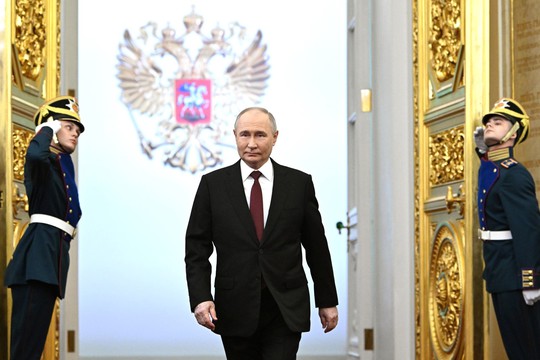Vladimir Putin at the inauguration ceremony as President of Russia
Photo: Kremlin.ru
Putin invaded Ukraine to enforce his version of the Monroe Doctrine, to prevent Ukraine from joining NATO, and to restore the strategic buffer zone on which Russia relied for its security for centuries. No sane military commander would allow an adversarial alliance to situate itself along more than 1,000 miles of its border, stresses Rebekah Koffler, a strategic military intelligence analyst at ‘Newsweek’.
The primary reason for continuing to flow billions of dollars in cash and weaponry to Ukraine for what is clearly becoming another Afghanistan, is that if we don't, Putin will march through Europe, invading a NATO country such as Poland or the Baltics. In this case, the U.S. would have to deploy armed forces to fight off the Russians to defend the Europeans. These are the talking points that the Washington Establishment politicians and their fellow commentariat members in the media have been using to convince the American people to continue parting with their hard-earned money.
But is it true?
Evidence indicates that this justification for depleting U.S. treasury and weapons arsenal represents a lack of understanding of Putin's thinking and Russia's security strategy — and the incompetence of our national security apparatus. At worst, it is a lie fed to the American people for some other reason.
Many in the West view Putin as a reckless dictator with imperial ambitions. As someone who spent her intelligence career studying and analyzing Putin's thinking and Russia's war-fighting doctrine and security strategy, I'm here to tell that Putin is entirely rational.
Putin invaded Ukraine to enforce his version of the Monroe Doctrine, to prevent Ukraine from joining NATO, and to restore the strategic buffer zone on which Russia relied for its security for centuries. No sane military commander would allow an adversarial alliance to situate itself along more than 1,000 miles of its border.
Putin never made it a secret what his goals were for Ukraine as well as other former Soviet states, such as Belarus, Moldova, and Georgia. In every public speech or official writing, the Russian strongman clearly declared that post-Soviet nations, including Ukraine, were off limits for Western influence; accepting them into NATO would be crossing Russia's red line.
Moreover, every strategic planning document of the Russian Federation, such as its Foreign Policy Concept, National Security Strategy, Military Doctrine and the like, in every iteration since 2000 and in some cases since 1993, codify Moscow's strategic goals of re-integrating the post-Soviet neighbors into a supranational alliance that Moscow calls The Eurasian Union.
By contrast, no plans to "integrate" or take by force a NATO member nation have been declared in any Russia's official doctrinal documents or official speeches made by Putin or the Kremlin.
As a former Defense Intelligence Agency officer and one of top three analysts on Russian Doctrine & Strategy who worked with the CIA's National Clandestine Service, I had access to the most sensitive intelligence — including Top Secret intelligence, with code word sub-compartments and red stripes indicating for President's Eyes Only. There was no intelligence revealing or suggesting that Putin had designs on Europe beyond the post-Soviet states. We've conducted multiple wargames simulating a Russia-US/NATO war and in all of the scenarios, a local conflict between Russia and its post-Soviet neighbor escalated into a war with the U.S. and NATO. No scenario included Russia attacking a NATO country that it did not consider as part of its strategic buffer zone.
In fact, none of the Intelligence Community's annual threat assessments that are published at the unclassified level by the Office of the Director of National Intelligence, including the one for 2024, include analysis suggesting that Putin would invade a NATO member.
If such intelligence existed, you can be sure that it would be declassified immediately.
To the contrary, several U.S. intelligence assessments contradict the Washington Establishment's narrative that Putin would invade a NATO member. An invasion of a NATO country would undoubtedly trigger Article 5 Collective Defense, which would require the deployment of NATO forces to defend the invaded NATO member. Claims that Putin would want a war with NATO on his hands is unequivocally disputed by the following statement from the 2024 Annual Threat assessment by the intelligence community, that "Russia almost certainly does not want a direct military conflict with U.S. and NATO forces and will continue asymmetric activity below what it calculates to be the threshold of military conflict globally."
U.S. and NATO leaders knew as early as in 2013 and possibly earlier about Putin's plans to restore Russia's strategic security perimeter. As a former senior official in the U.S. intelligence community, I personally briefed President Obama's White House national security staff on Putin's plans and Russia's war-fighting strategy multiple times. I also briefed countless top U.S. military commanders and Pentagon officials, as well as NATO ministers and military leaders, including just months prior to invasion of Crimea in 2014.
As vice president at the time, the go-to person on Ukraine policy, and the architect of the failed Russia "reset" strategy, Joe Biden had to be made aware of those briefings. If anyone in the U.S. and NATO senior leadership thought that Putin would invade a NATO country, why didn't they beef up there defense spending prior to Russia's attack on Ukraine in 2022? To this day, the majority of NATO nations fail to spend the two percent of GDP guideline on defense.
Putin is not suicidal. Invading a NATO country is not part of his agenda.
If Washington elites are hell bent on continuing to fund another forever war, impoverishing ordinary Americans, as inflation is raging in our homeland, they should pick a more clever excuse, Rebekah Koffler concludes.
read more in our Telegram-channel https://t.me/The_International_Affairs

 12:38 16.05.2024 •
12:38 16.05.2024 •























